Got Mad? These Tips Will Help
Tame your Temper
Fuming today because someone cut you off in traffic? Blood pressure zooming sometimes when your child refuses to cooperate? Does ANY LITTLE THING set you off?! Anger is a normal and even healthy emotion — but it's important to deal with it in a positive way. And no, it is NOT normal that ANYTHING sets you off!. Uncontrolled anger can have a very destructive effect on your health and hurt those around you. Ready to get your anger under control? Start by considering these anger management tips to help get you to a point where your mood does not shift based on the insignificant actions of someone else.
1. Think before you speakIn the heat of the moment, it's easy to say something you'll later regret. Take a few moments to collect your thoughts before saying anything — and allow others involved in the situation to do the same.Clearly the whole world would be a different place if we could all do what the blue-eyed angel opposite suggests ALL the time - don't hold your breath. |
 |
2. Once you're calm, express your angerAs soon as you're thinking clearly, express your frustration in an assertive but non-confrontational way. State your concerns and needs clearly and directly, without hurting others or trying to control them.Easy words to say, but if you just wait a bit, take a few breaths, you will be calmer, and try the above without screaming - and yes, if you could see your calm self from outside, you would see beauty. |
 |
 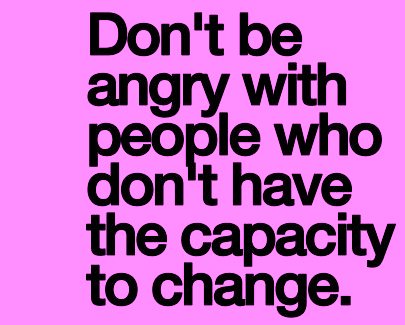
|
You
should realize that it is hard for most people to
change, just as it is to overcome your own anger.
That's why we like to watch the Mr. Scrooge story [A
Christmas Carol] every year - someone actually
changed!. Better to try and explain your own anger - much as we like to see the hairy lapdog get what he deserves, slapping others does not really help - it can start a world war. |
 |
3. Get some exercisePhysical activity will help reduce stress that can cause you to become angry. If you feel your anger escalating, go for a walk or even run, or spend some time doing other enjoyable physical activities. There is a direct effect, as this stimulates your vagus nerve which has an excellent calming effect. Some people even have a vagus nerve stimulator inserted with a remote control, it works so well. |
| The only exercise some people get is RUNNING their mouth; JUMPING to conclusions and PUSHING their luck - not everyone can be calm all the time, and many (in America) have guns - so Watch Out!. | Luckily,
human lives are usually quite long, so while the
statement at left might be true for people sometimes,
it is certainly not true all the time (Phew). |
Take a Time-Out - and Identify Possible Solutions ...
4. Take a timeoutTime-outs aren't just for kids. Give yourself short breaks during times of the day that tend to be stressful. A few moments of quiet time might help you feel better prepared to handle what's ahead without getting irritated or angry.Let's be clear here - usually you know what will stress you out, and you know when it is coming - so you CAN get ready by taking a restful break just before that time. The question really is - Will you do so? |
 |
5. Identify possible solutionsInstead of focusing
on your madness, work on resolving the issue at
hand.
Does your child's messy room drive you crazy? Close the door, and let it go. Is your partner late
for dinner every night? Messy in the kitchen?
Eat on your own! Sing
while you clean up!
Remind yourself that
anger won't fix anything and might only make it
worse.
The diagram
at right just makes one exhausted by reading it.
Do you really want to spend so much time being
angry?
|
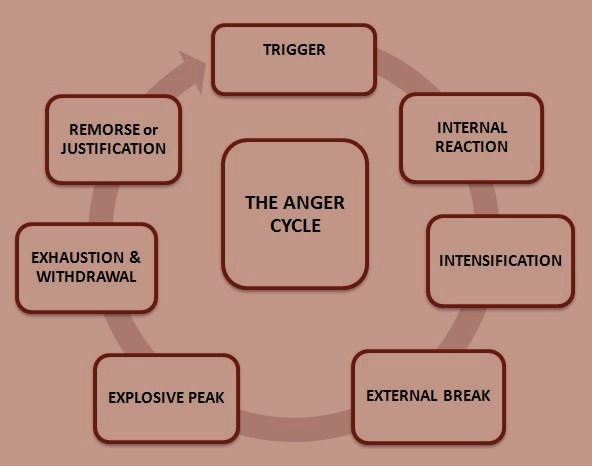 |
 |
These marvelous Minion characters work patiently
with their dreadful overlords. Echos of slavery ring
down the centuries and are not altogether silent in
today's (2019) world. If you can be bothered to read
some books about it, the total disgusting awfulness
of man's treatment of man over thousands of years
can be a very shocking realization, going a long way
to helping sober you up and calm you down. There's
plenty of work to do on this subject, on which we
could better spend our energy. |
 |
Proposing a solution - Once again, easier said than done, but nonetheless true for all that. A certain amount of whining is normal, but at some point you really should suggest a solution. |
 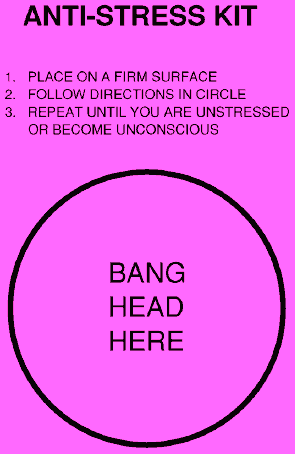 |
6. Stick with 'I' statementsTo avoid criticizing or placing blame — which might only increase tension — use "I" statements to describe the problem. Be respectful and specific. For example, say, "I'm upset that you left the table without offering to help with the dishes" instead of "You never do any housework." |
  |
We can briefly refer to the subject of
vengeance - Cute though the sentiments expressed at
left may be, the reality of Karma must stay our
hand(s)! - Hence the age-old saying - Woe to
(s)he who is the instrument of karma -
They are not kidding!. Revenge is (partly) what movies are for! Please! You are allowed watch with pleasure, exulting as the bad guy finally gets what he richly deserves, without bringing the inevitable payback that ALWAYS comes to those who are the instruments of Karma - It's only a movie. |
7. Don't hold a grudgeForgiveness is a powerful tool. If you always allow anger and other negative feelings to crowd out positive feelings, you might find yourself swallowed up by your own bitterness or sense of injustice. But if you can forgive someone who angered you, you might both learn from the situation and strengthen your relationship.Get to a point where your mood does not shift based on the usually insignificant actions of someone else. |
  |
We can accept that cannot control the feelings, beliefs or behaviors of others. Try to be realistic and accept that people are the way they are. You cannot change how other people behave or think but you can change how you deal with others, working on a positive attitude.
Please understand that WHEN YOU LOSE YOUR TEMPER - I LOSE MY APPETITE - for food, for being around you, for wanting to be nice to you. And it takes a while, once you calm down, for these feelings to go away. Is this a surprise? |
 |
 |
The simple act of laughing -- can go along way to reduce anger, especially over the longer term. Be aware that although laughing can help you feel better you need to make sure there is no danger of misinterpretation. Try to ensure the angry person does not think you are laughing at them. |
 |
8. Use humor to release tensionLightening up can help diffuse tension. Use humor to help you face what's making you angry and, possibly, any unrealistic expectations you have for how things should go. Avoid sarcasm, though — it can hurt feelings and make things worse.The only exercise some
people get is RUNNING their mouth; JUMPING
to conclusions and PUSHING their
luck -
|
Breathe Slowly and Relaxsome simple breathing exercises. Breathing exercises can help you to relax and slow your heart rate to more normal levels (Who knew!?). When you start to feel tense and stressed, take a few minutes and concentrate on relaxing and calm, steady breathing (Yes, please do take the time!): Inhale and exhale deeply 3 or 4 times in a row. Count slowly to four as you inhale. Count slowly to eight as you exhale. Focus on feeling the air move in and out of your lungs. Concentrate and feel your ribs slowly rise and fall as you repeat the exercise. When you feel dizzy, it might be enough! |
 |
Proven Buddhist mental practice
|
 |
Practice Relaxation in many ways ...
9. Practice relaxation skillsWhen your temper flares, put relaxation skills to work. Practice deep-breathing exercises, imagine a relaxing scene, or repeat a calming word or phrase, such as "Take it easy." You might also listen to music, write in a journal or do a few yoga poses — whatever it takes to encourage relaxation.And you may need reminding - that WHEN YOU LOSE YOUR TEMPER - I LOSE MY APPETITE - for loving you, for food, for being around you, for wanting to be nice to you. And it takes a while, once you calm down, for these feelings to dissipate. Is this a surprise? |
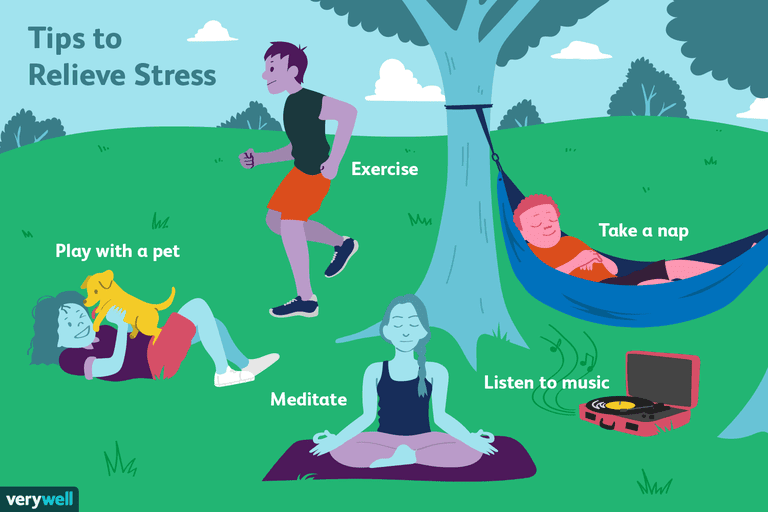 |
10. Know when to seek helpLearning to control anger is a challenge for everyone at times. Seek help for anger issues if your anger seems out of control, causes you to do things you regret or hurts those around you.Note the sage advice at right - LEAVE ME ALONE - which is probably NOT what you want, but you are getting it. So even when you have calmed down by next day, your best beloveds will still want to leave you alone. Maybe not what you wanted. |
|
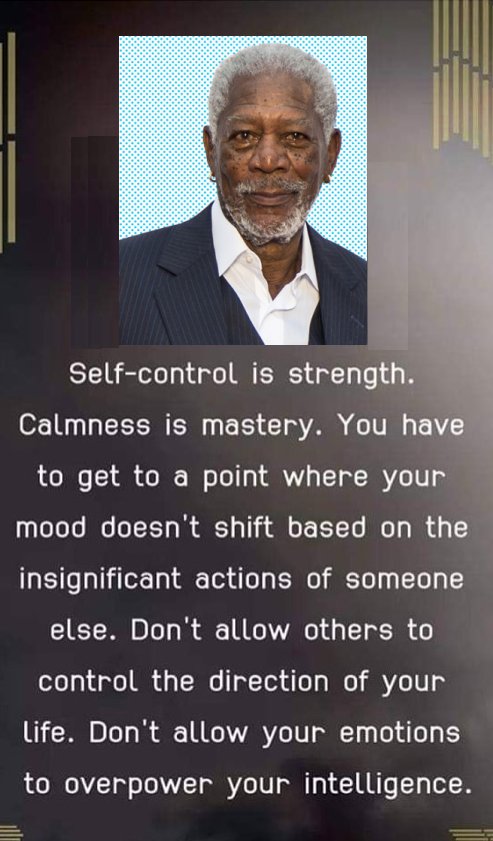 |
Morgan Freeman knows about this too - among other wise things, he says "Self-control is strength. Calmness is mastery. You have to get to a point where your mood does not shift based on the insignificant actions of someone else. Don't allow others to control the direction of your life. Don't allow your emotions to overpower your intelligence"That seems pretty clear! No doubt even the Buddha would approve - as does Yongey Mingyur as quoted. |
|
|
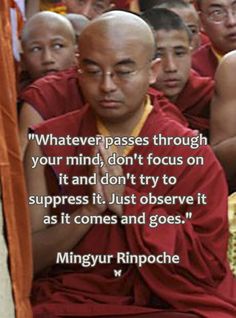 |








